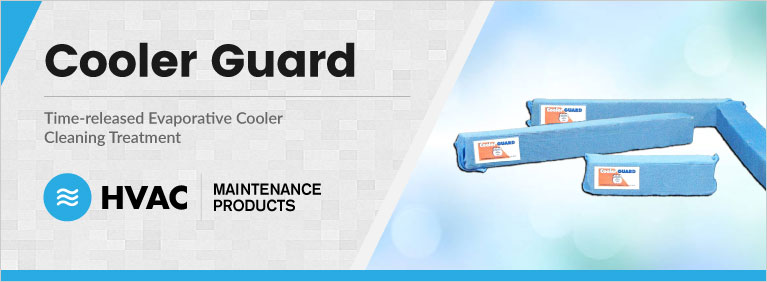Time-Released Evaporative Cooler Cleaning Treatment
Extend evaporative cooler pads indefinitely using Cooler Guard evaporative cooler cleaning treatment. Millions of dollars get spent replacing evaporative cooler pads and parts only because they are scaled up. Scaled pad surfaces decrease the unit’s efficiency and increase the potential of moisture getting into the air stream. Neglected evaporative coolers contain sludge and other deposits in the sump, affecting the quality of the air which runs through them. The problem of scale deposit build is real. Time-consuming evaporative cooler clean up using acids, and other harsh chemicals can be a hazard, but this can be prevented.
Cooler Guard:
- Cleans wherever the water reaches.
- Dissolves the build-up that causes corrosion.
- Guards against future deposits.
- Extends cooler pad life indefinitely.
- Provides a fresh cooling environment.
- Keeps units clean and trouble-free.
- pH neutral to preserve pad life.
- Maximizes airflow for top efficiency.
Cooler Guard Resources:
Cooler Guard FAQs:
Cooler Guard helps prevent scale deposition in evaporative coolers.
Cooler Guard is supplied as a solid polymer block.
Cooler Guard is sized for 2,000 cfm, 4,000 cfm and 10,000 cfm coolers. You can use multiples of these for odd sized coolers.
No. Cooler Guard is not an acid and will not affect metal parts.
Yes. Cooler Guard is designed so you can shut off your bleed-off valve. You will need to remove the sump water and replace the Cooler Guard every 4 – 6 weeks. If you discharge even 1 gallon of water from your cooler a minute, this amounts to over fourteen hundred gallons per day – a very expensive proposition.
Yes. Cooler Guard has removed old deposits from pads that previously were mostly plugged with scale.
Yes, you should drain your sump and rinse it out thoroughly before each use of Cooler Guard.
Cooler Guard works by breaking down the scale deposits into very fine, almost molecular sized particles that are kept in suspension without the use of harmful acids. Every four to six weeks, even the small particles may deposit, so you should drain and remove the water at that time.

